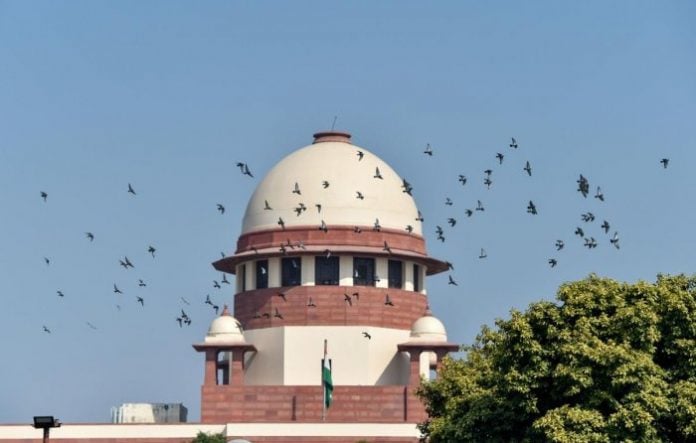The Supreme Court has allowed instant messaging application like whatsapp to be used to serve summons and notices as well as via email and fax.
The top court said, “It has been brought to our notice that it was not possible to visit post offices for services of notices, summons, and pleadings.”
“We, therefore, consider it appropriate to direct that such services of all the above may be effected by e-mail, FAX, commonly used instant messaging services, such as WhatsApp, Telegram, Signal etc. However, if a party intends to effect service by means of said instant messaging services, we direct that in addition thereto, the party must also effect service of the same document/documents by e-mail, simultaneously on the same date,”said the Court.
A bench headed by the Chief Justice SA Bobde, Justice R Subhash Reddy & Justice AS Bopanna said all methods to be employed to prove a valid service on a party.
The Supreme Court in a Suo Motu writ petition has ordered that all periods of limitation prescribed under the Arbitration and Conciliation Act 1996 shall be extended w.e.f. 15.03.2020 till further orders. In that order Attorney General has sought a minor modification.
Thereafter, on 10/07/2020, the Supreme Court has modified the said order and said, “ Section 29A of the Arbitration and Conciliation Act, 1996 does not prescribe a period of limitation but fixes a time to do certain acts, i.e. making an arbitral award within a prescribed time. We, accordingly, direct that the aforesaid orders shall also apply for extension of time limit for passing arbitral award under Section 29A of the said Act. Similarly, Section 23(4) of the Arbitration and Conciliation Act, 1996 provides for a time period of 6 months for the completion of the statement of claim and defence. We, accordingly, direct that the aforesaid orders shall also apply for extension of the time limit prescribed under Section 23(4) of the said Act.”
With reference to the prayer, that the period of validity of a cheque be extended. The Court find that the said period has not been prescribed by any Statute but it is a period prescribed by the Reserve Bank of India under Section 35-A of the Banking Regulation Act,1949. “We do not consider it appropriate to interfere with the period prescribed by the Reserve Bank of India, particularly, since the entire banking system functions on the basis of the period so prescribed,” said the Court.
On the previous hearing, “Shri K.K. Venugopal, learned Attorney General and Shri V. Giri, learned senior counsel, appearing for the Reserve Bank of India, seek permission to file a short note on the various aspects of the limitation involved in the matter.”
On the issue of “Pre-Institution Mediation and Settlement under Section 12A of the Commercial Courts Act, 2015.”
The Court directed, “Under Section 12A of the Commercial Courts Act, 2015, time is prescribed for completing the process of compulsory pre-litigation, mediation and settlement. The said time is also liable to be extended. We, accordingly, direct that the said time shall stand extended from the time when the lockdown is lifted plus 45 days thereafter. That is to say that if the above period, i.e. the period of lockdown plus 45 days has expired, no further period shall be liable to be excluded.”
The Court by its order dated 06/05/2020 had ordered that all periods of limitation prescribed under the Arbitration and Conciliation Act, 1996 and under section 138 of the Negotiable Instruments Act 1881 shall be extended with effect from 15.03.2020 till further orders to be passed by the Court in present matter.
On 23rd March, 2020, the Supreme Court had took Suo Motu cognizance of the situation arising out of the challenge faced by the country on account of Covid-19 Virus and resultant difficulties that may be faced by litigants across the country in filing their petitions/applications/suits/ appeals/all other proceedings within the period of limitation prescribed under the general law of limitation or under Special Laws (both Central and/or State). To obviate such difficulties and to ensure that lawyers/litigants do not have to come physically to file such proceedings in respective Courts/Tribunals across the country including this Court, it was ordered that a period of limitation in all such proceedings, irrespective of the limitation prescribed under the general law or Special Laws whether condonable or not shall stand extended with effect from 15th March 2020 till further order/s to be passed by the Court in present proceedings.
The Court while exercising the power under Article 142 read with Article 141 of the Constitution of India declared that this order is a binding order within the meaning of Article 141 on all Courts/Tribunals and authorities.
“This order of Supreme Court may be brought to the notice of all High Courts for being communicated to all subordinate Courts/Tribunals within their respective jurisdiction. Also notice is to be issued to all the Registrars General of the High Courts in respect of the same, and it is returnable in four weeks from today”, Said Apex Court.
Read the order here;
10-India Legal Bureau


